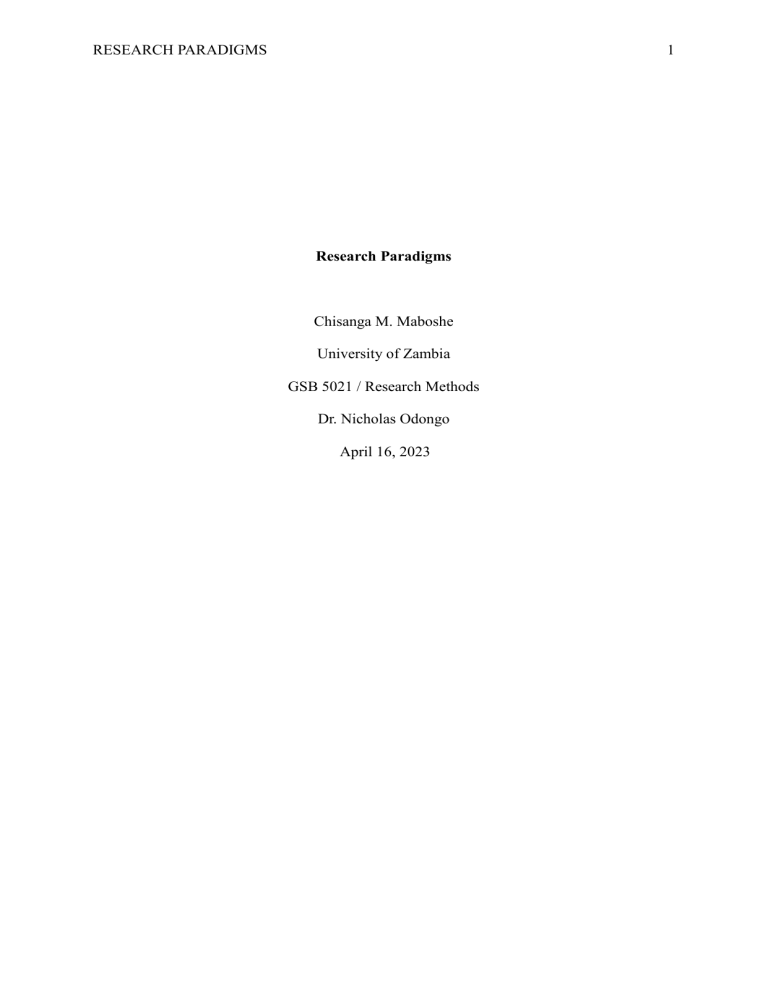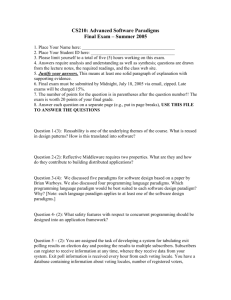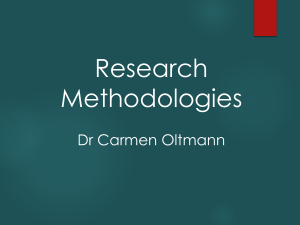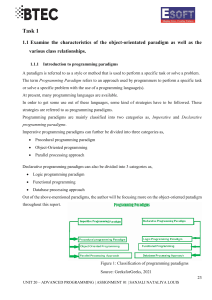
RESEARCH PARADIGMS 1 Research Paradigms Chisanga M. Maboshe University of Zambia GSB 5021 / Research Methods Dr. Nicholas Odongo April 16, 2023 RESEARCH PARADIGMS 2 Research Paradigms Research paradigms can be thought of as comparable to several glasses through which researchers view the world and carry out their work( Lincoln et al.,2011).They can be thought of as broad frameworks or views that influence the way in which research is conducted and how new information is obtained. This can illustrated as looking at the same thing from a variety of perspectives or using a camera that has a number of various filters so that you may capture distinct facets of the object. In a similar vein, different research paradigms offer various approaches to comprehending and learning about the world. These approaches involve diverse views regarding the nature of reality, different types of knowledge, and distinct research methodologies. The choice of research paradigm influences the research design, methods, and interpretation of findings, and researchers should carefully consider their underlying philosophical assumptions when conducting research. Creswell and Creswell (2017) reiterate that when planning a research study, researchers need to give some consideration to the philosophical and worldview assumptions that they bring to the table. Types of Research Paradigms Research paradigms help researchers approach their research questions, choose appropriate methods, collect and analyze data, and interpret research findings. Several philosophical world views exist and they still influence the practice of research .Given the forgoing the following paragraphs will highlight the existing research paradigms and their application. Positivism The concept that reality exists independently of human experience and that it can be investigated using objective and scientific means is at the heart of the positivist worldview. It places a strong emphasis on the use of quantitative data, the utilization of deductive RESEARCH PARADIGMS 3 reasoning, and the validation of hypotheses in order to prove causality and generalizability. Research from a positivist perspective aims to unearth the universal rules and principles that underpin human behavior and the natural world. Empirical evidence is often generated via the use of experimental designs, surveys, and statistical analysis. Following the analogy of lenses in the opening paragraphs positivism is like a scientific lens that focuses on objective, measurable, and universal truths using quantitative methods (Creswell, 2017). Constructivist The constructivist paradigm stresses the subjective character of human experiences and maintains that reality is formed via individual and societal interpretations. This view of reality is central to the paradigm. It acknowledges the role of the researcher in the process of knowledge co-construction with the participants of the study, and it places significance on many viewpoints and a variety of voices. Exploring individual and collective meanings, experiences, and perspectives is a common goal of constructivist research, which often makes use of qualitative research methodologies such as grounded theory, phenomenology, and narrative inquiry (Mahoney, 2004). Following the analogy of lenses in the opening paragraphs constructivism is like a lens that highlights the role of perception and interpretation in constructing knowledge. Pragmatic The pragmatic paradigm places an emphasis on the direct application of research to issues that occur in the actual world. It tries to combine many techniques and methodologies in order to handle complicated challenges and provide answers that are meaningful and relevant to the various stakeholders. Pragmatic research often makes use of a mixed methods approach, which combines quantitative and qualitative approaches, and places an emphasis on the utility and relevance of research results in real-world contexts (Creswell, 2017). Using RESEARCH PARADIGMS 4 the lens analogy Pragmatism is like a problem-solving lens that seeks practical solutions using mixed methods. Critical Paradigm According to Lather (2006) the critical paradigm places an emphasis on the social, political, and economic factors that shape human behavior and contribute to social inequality. It tries to question the current quo as well as exposing power inequalities, oppression, and other forms of social injustice. The goal of critical research is to improve social conditions by bolstering the agency of underrepresented groups. In order to investigate social problems from an analytical stance, it often makes use of qualitative research techniques such as critical discourse analysis, participatory action research, and ethnography. Interpretive Paradigm According to the interpretative paradigm, reality is an individual's interpretation, and it is built via the sum of an individual's experiences and the interactions they have with others. Understanding the meanings and interpretations that people attribute to their experiences, behaviors, and the social circumstances in which they find themselves is a primary focus of this approach. Utilizing qualitative research techniques such as interviews, observations, and content analysis, interpretive research aims to investigate the complexities and variety of human behavior, culture, and social phenomena. This kind of study is called "interpretation." It places a strong emphasis on the role that environment, language, and culture have in determining human behavior and the occurrence of social phenomena (Denzin & Lincoln, 2018). Types of Research and Corresponding Paradigms Quantitative research focuses on gathering and analyzing numerical data in order to make statistical inferences and draw conclusions (Pawar, 2020).The positivist paradigm is ideal for quantitative research because it implies that there is an objective world that can be RESEARCH PARADIGMS 5 explored using scientific procedures. Researchers in the positivist paradigm aim for objectivity, utilize standardized data gathering procedures, and often use deductive reasoning. Experiments, surveys, and statistical analyses are examples of quantitative research. Qualitative research seeks to understand and comprehend human behavior and experiences in their natural setting (Pawar, 2020). To gather insights and establish a comprehensive knowledge of the phenomena being investigated, qualitative researchers collect and analyze non-numerical data such as narratives, interviews, observations, and documents. The interpretative paradigm is suited for qualitative research because it stresses the subjective character of reality and the relevance of context, meaning, and interpretation. In the interpretative paradigm, researchers often utilize inductive reasoning, conduct continuous data analysis, and strive for comprehensive and nuanced explanations of the phenomena of interest. Mixed methods research includes quantitative and qualitative aspects. Mixed methods research attempts to blend numerical and non-numerical data in order to give a more complete picture of a study subject or problem (Pawar, 2020). The pragmatic paradigm is suited for mixed methods research because it focuses on the practical elements of research and tries to employ the most appropriate techniques to solve a research issue, regardless of their philosophical origins. Researchers in the pragmatic paradigm may apply a mix of deductive and inductive thinking, organized and unstructured data gathering techniques, and appreciate numerical and qualitative data for their distinct strengths and contributions. Conclusion To summarize, research paradigms are critical frameworks that direct how scientists think about and tackle research problems. Researchers may adopt a more detailed and RESEARCH PARADIGMS 6 thorough approach to examining complicated phenomena and delivering meaningful research findings if they are able to understand and integrate multiple research paradigms. RESEARCH PARADIGMS 7 References Creswell, J. W., & Creswell, J. D. (2017). Research Design. Denzin, N. K., & Lincoln, Y. S. (Eds.). (2018). The Sage handbook of qualitative research. Sage. Lather, P. (2006). Paradigm proliferation as a good thing to think with: teaching research in education as a wild profusion. International Journal of Qualitative Studies in Education, 19(1), 35–57. https://doi.org/10.1080/09518390500450144 Lincoln, Yvonne, Susan A. Lynham, and Egon G. Guba. 2011. Paradigms and perspectives in contention. In The Sage Handbook of Qualitative Research. Edited by Norman K. Denzin and Yvonna S. Lincoln. Thousand Oaks: Sage Publications, pp. 91–95. Mahoney, M. J. (2004). What Is Constructivism and Why Is It Growing? [Review of the book Studies in meaning: Exploring constructivist psychology, by J. D. Raskin & S. K. Bridges, Eds.]. Contemporary Psychology, 49(3), 360– 363. https://doi.org/10.1037/004362 Pawar, N. (2020). Type of Research and Type Research Design. ResearchGate. https://www.researchgate.net/publication/352055750_6_Type_of_Research_and_Typ e_Research_Design .




